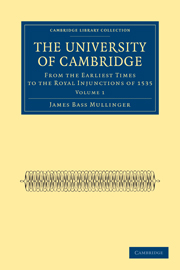Book contents
- Frontmatter
- PREFACE
- Contents
- CHAP. I FROM THE ROYAL INJUNCTIONS OF 1535 TO THE FOUNDATION OF TRINITY COLLEGE
- CHAP. II FROM THE FOUNDATION OF TRINITY COLLEGE TO THE ACCESSION OF ELIZABETH
- CHAP. III FROM THE ACCESSION OF ELIZABETH TO THE DEATH OF ARCHBISHOP PARKER
- CHAP. IV FROM THE DEATH OF ARCHBISHOP PARKER TO THAT OF LORD BURGHLEY
- CHAP. V COLLEGE LIFE
- CHAP. VI FROM THE DEATH OF LORD BURGHLEY TO THE ACCESSION OF CHARLES I
- APPENDIX
- INDEX
CHAP. VI - FROM THE DEATH OF LORD BURGHLEY TO THE ACCESSION OF CHARLES I
Published online by Cambridge University Press: 05 November 2011
- Frontmatter
- PREFACE
- Contents
- CHAP. I FROM THE ROYAL INJUNCTIONS OF 1535 TO THE FOUNDATION OF TRINITY COLLEGE
- CHAP. II FROM THE FOUNDATION OF TRINITY COLLEGE TO THE ACCESSION OF ELIZABETH
- CHAP. III FROM THE ACCESSION OF ELIZABETH TO THE DEATH OF ARCHBISHOP PARKER
- CHAP. IV FROM THE DEATH OF ARCHBISHOP PARKER TO THAT OF LORD BURGHLEY
- CHAP. V COLLEGE LIFE
- CHAP. VI FROM THE DEATH OF LORD BURGHLEY TO THE ACCESSION OF CHARLES I
- APPENDIX
- INDEX
Summary
Election of the Earl of Essex as successor to Burghley in the Chancellorship. His visit to Cambridge in 1598
The short interval which separated lord Burghley's death from that of Elizabeth was marked by few events of importance in the histoŕy of the university. Robert Devereux, second earl of Essex, was unanimously elected to succeed Burghley as chancellor; although seven years before, thwarted by the caprice of his royal mistress, he had been an unsuccessful candidate for the like honour at Oxford. In the course of the same year, he visited Cambridge and was lodged in Queens’ College, where the apartment which he occupied, Fuller tells us, was for long after known as ‘Essex chamber.’ Here ‘a pleasant comedy,’ entitled Lelia, was acted before him, and he departed, having won all hearts by his stately courtesy, his affability, and his munificence. Within less than three years, Whitgift and Bancroft, in London, had each been called upon, as loyal subjects, to arm their followers to aid in the suppression of his mutinous attempt to raise the city, and the once idolised favourite of the people had suffered a traitor's death on Tower Hill. He was succeeded in the chancellorship by Sir Robert Cecil, Burghley's only son by the lady Mildred, who for the preceding nine years had filled the office of High Steward in the university. Cecil, afterwards earl of Salisbury, had, like his illustrious father, been educated at St John's, but he sheds no such lustre on his college. He had his father's caution, but not his large tolerance; his capacity for business, without his capacity for social and domestic enjoyment.
- Type
- Chapter
- Information
- The University of Cambridge , pp. 440 - 576Publisher: Cambridge University PressPrint publication year: 2009First published in: 1873

